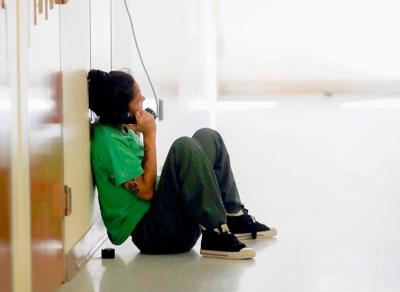Working for $5 per week while behind bars, Jasmin Borges could afford just one 20-minute phone call with her daughters each week.
“When I came home 12 years later, nothing could prepare me for the cold, dark truth that I didn’t know my daughters,” Borges said at an Oct. 4 legislative hearing. “I had to learn my daughters. I had to learn their personalities, their likes and dislikes.”
Borges, now an organizer for the Massachusetts Bail Fund, was one of more than 25 speakers at the hearing who advocated for a bill that would make phone calls free for people incarcerated in Massachusetts. A similar bill was on the slate for a Thursday hearing by the Legislature’s committee on public safety and homeland security. The new hearing begins at 10 a.m. and can be accessed at malegislature.gov/Events/Hearings/Detail/3990.
Massachusetts families spent around $25 million in 2018 on phone calls to incarcerated relatives, the advocacy group Worth Rises has estimated. Prison telecommunications companies — three companies dominate the $1.4 billion industry — raked in the profits, and correctional facilities received around $7 million in “site commissions.”
In June, Connecticut passed legislation to allow 90 minutes of free phone calls per day from prisons, becoming the first state to do so, although cities such as New York and San Francisco have made phone calls from jails free.
A coalition is working to pass legislation that would make Massachusetts the second state to offer free phone calls to people who are incarcerated.
Days after Connecticut finalized its law, Massachusetts sheriffs announced an agreement to provide at least 10 minutes of free phone calls per week and to charge no more than 14 cents per minute afterward ($2.10 for a 15-minute call). Sheriffs previously have expressed opposition to making all phone calls free, claiming that they use site commissions to pay for rehabilitative programming.
Critics of the prison telecommunications industry, however, say the true cost of providing phone calls remains a fraction of even the 14-cent rate. In Illinois, an in-state call from a state prison costs less than a penny per minute. In New Hampshire, the cost is 1.3 cents per minute.
“If the state and counties believe in rehabilitation, they must pay for the treatment and programs in prison, not extract that money from prison families who cannot afford it and have to ration their calls because [costs are] so inflated,” Bonnie Tenneriello, a staff attorney for Prisoners’ Legal Services of Massachusetts, said at the Oct. 4 hearing.
Phone calls, Tenneriello added, remain key to helping people remain connected to support systems and loved ones who can help with reentry, although the present cost prevents many people from maintaining the level of connection they need.
“Many studies have shown that people who are connected to their families and community during incarceration are far less likely to go back to prison,” Tenneriello said. “Each person who is reincarcerated costs the state an average of around $70,000 a year.”
In state and federal prisons, less than two-thirds of people with a history of mental illness access mental health treatment, and in jails, less than half of people with a history of mental illness access treatment, a 2017 report from the U.S. Department of Justice found. Suicide is the leading cause of death in jails, responsible for around 30 percent of deaths.
CHICOPEE — Jennifer Thurston's family spends up to $50 a week on phone calls to stay in touch with her while she is in custody. It's a lot for a family struggling with poverty and poor …
Borges, who was incarcerated for 12 years at the Massachusetts Correctional Institution-Framingham, said that lawmakers should listen to incarcerated and formerly incarcerated people as they seek to understand the impacts of current policies and proposed solutions. Her unit at MCI-Framingham had three phones for around 60 women, Borges said.
“You stand in line for 20, 30 minutes to make one 20-minute phone call,” Borges said in a Wednesday phone interview. “And if your loved ones didn’t pick up the phone, you would have to hang up and get back in line again.”
Borges said she had to make difficult decisions between calling her sister or calling her daughters. It cost her 25 cents to send an email.
“Phone calls are a way to reconnect you with your humanity, a way to reconnect you with your identities, whether as a mother, daughter, sister, wife, friend or life partner, they’re a lifeline,” Borges said. “Because the system is set up, it takes away all those identities and views you only as an inmate.”
State Sen. Jamie Eldridge, D-Acton, said at the Oct. 4 hearing that the judiciary committee, which he co-chairs, asked the Department of Correction if it would allow people currently incarcerated to testify at the hearing, but the department declined. Borges said that she would like to see lawmakers visit correctional facilities themselves to hear directly from people who are incarcerated.
“I think it’s hard for people who have never been incarcerated to understand how a phone call or a video phone call can be the biggest thing to save your life,” Borges said. “They’re just a lifeline.”




